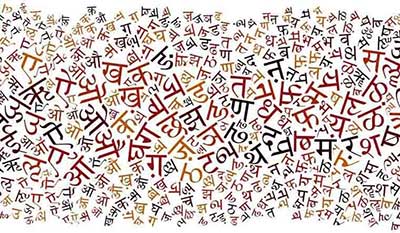Date: 22/10/2022
Relevance: GS-1: Salient features of Indian Society, Diversity of India.
Key Phrases: Official Languages Act, 1963, Bridging the Gap Between the Northern and Southern Regions, Endanger Diversity, Create Differences Among People
Why in News?
- The 11th volume of the Report of the Official Language Committee was recently submitted to the President of India.
Background:
- Article 343 of the Constitution declares that Hindi in Devanagari script shall be the official language of the Union.
- The Constituent Assembly had witnessed extensive debate on the question of official language.
- Finally, Hindi was declared the official language of the Union and it was also provided that the English language will continue for 15 years from the commencement of the Constitution.
- Furthermore, the Parliament may provide by law for the continuation of English even after the period of 15 years.
- Accordingly, Parliament enacted the Official Languages Act in 1963, providing for the continuance of English indefinitely as official language along with Hindi for the official purposes of the Union and for transaction of business in Parliament.
Key recommendations of the Official Language Committee:
- Hindi should replace English as the language of examinations for recruitment to the government.
- Hindi should be the only medium of instruction in all technical and non technical institutions like Kendriya Vidyalayas, Indian Institutes of Technology (IITs), Indian Institutes of Management (IIMs) and the central universities;
- It must be constitutionally binding on State governments to propagate Hindi.
Official language committee:
- The official language committee is a statutory committee constituted in 1976 under Section 4 of the Official Language Act, 1963.
- The Official Language Committee, headed by the Union Home Minister, was set up to review the progress made in the use of Hindi for the official purposes of the Union as mandated by Article 351 of the Indian Constitution and submit a report to the President.
- The Committee consists of 30 members out of which 20 members are from Lok Sabha and 10 are from Rajya Sabha.
- The Act makes it obligatory for the President to issue directions “in accordance with the whole or any part of the report” (Section 4(4)).
- Thus, it must be ensured that the committee’s recommendations are acted upon.
Issues with the recommendations of the committee:
- As per the recommendations of the Official Language Committee, Hindi should totally replace English as medium of instruction in central universities, IIMs, IITs, etc. although the committee does not have any authority to recommend the medium of instruction in universities and professional institutions.
- A statutory committee constituted under an act has no mandate to recommend the discontinuation of English whose continuance along with Hindi has been declared by the Parliament by a law.
- India has earlier seen great emotional upsurge, violent protests and immolations etc. in the country’s southern parts in the 1960s against the attempts of excluding English and replacing it with Hindi.
- The language used in the examination for recruitment to the All India services will be Hindi alone and in this case, the candidates from the non-Hindi States, the south in particular, will face a great disadvantage when compared to those whose mother tongue is Hindi.
- This would lead to a gradual elimination of candidates from the non-Hindi region from the central services like the All India Services.
Arguments in favour of continuation of English language:
- India has two major groups of languages - the Indo-European language group and the Dravidian language group.
- Hindi belongs to the former and Tamil, Telugu, Malayalam and Kannada belong to the latter.
- However, the union of North and South has been made possible only through the medium of English by bridging the gap between the northern and southern regions since, North and South are two different parts so far as language is concerned and this linguistic relationship will cease to exist in the absence of English
- In a country where there are two major language groups, the idea of one official language may not go far in fostering the unity of the people and in the long run, it may give rise to serious imbalances in regional representation in the all India services as well as the personnel structure of the Union government.
- English is crucial for the interaction of Indians with the world and in acquiring knowledge in science and technology as well as in other fields of human activity.
Conclusion:
- The massive public opinion in the south favours the continuation of English as one of the official languages.
- Today, the Union has Hindi and English as two official languages — as in Canada which has English and French as its official languages.
- In these circumstances, the policymakers should seriously think of making the provision constitutionally that Hindi and English should be the official languages of the Union.
- People love Hindi and all other Indian languages.
- Therefore, all efforts should be made to ensure their natural development to be able to meet the requirements of modern science and technology.
Source: The Hindu
Mains Question:
Q. The 11th volume of the Report of the Official Language Committee was recently submitted to the President of India. Critically examine the recommendations of the committee as well as arguments in favour of continuation of English language. (250 words).








